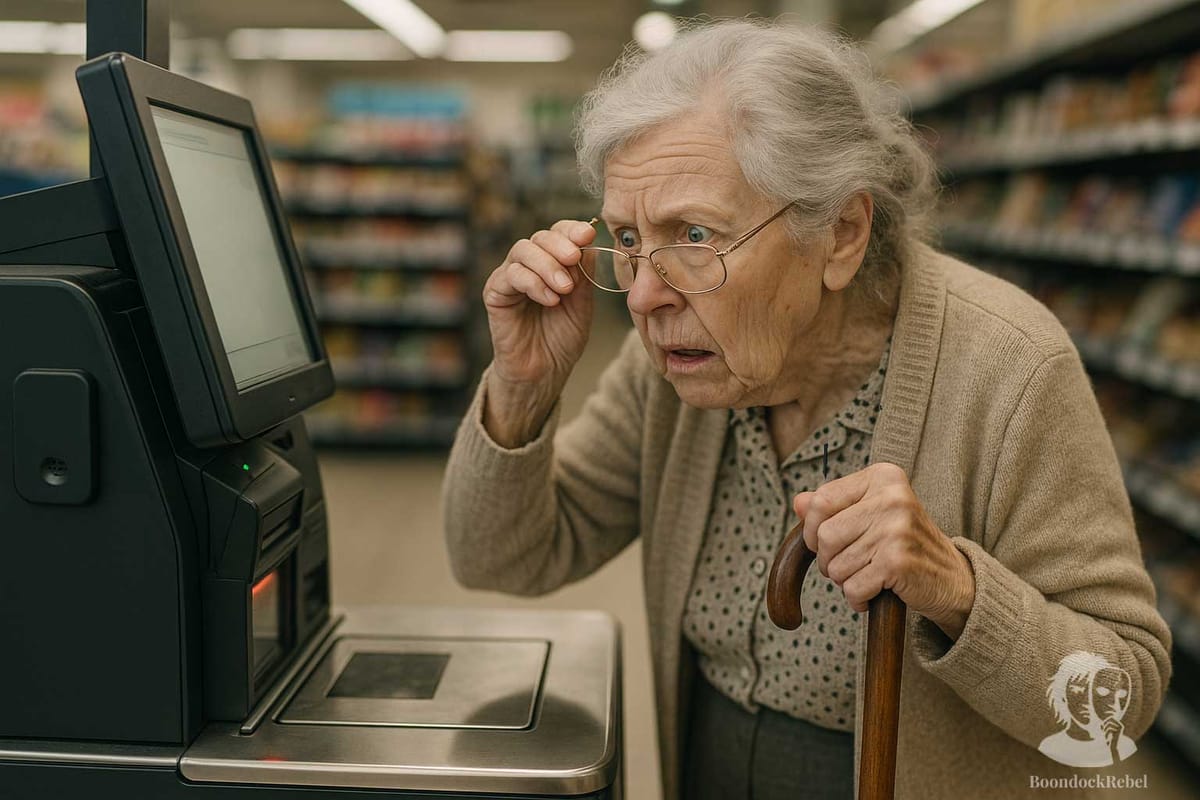CUSTOMER OR CASHIER? Installment 1: You Work Here Now
Grocery chains didn’t automate—they outsourced. To you. You shop, scan, bag, pay, and get stopped on your way out—to prove you did the job. No training. No wage. No discount. You don’t work there. But they’re sure acting like you do.

We bag the groceries. They bag the profits.
I went to the grocery store. I did the shopping. I did the scanning. I bagged the groceries. I paid.
And then, as I tried to leave, I was stopped by an employee—to check if I was stealing. Or, more accurately, to make sure I’d done the job correctly.
The job I was never trained for, never hired for, and never paid to do.
Let’s just say it out loud:
I don’t work here. But you’re sure treating me like I do.
This is what shopping looks like now. You walk in as a customer and leave as unpaid labor. No compensation. No benefits. No choice. Grocery chains have quietly offloaded the work once done by real employees onto the rest of us. They’ve fired staff, installed machines, and passed the labor to customers—without asking, acknowledging, or compensating.
Even returning your cart is now part of this unpaid cycle. It feels polite, responsible. But it’s another way companies eliminate jobs and pocket the savings. If we keep doing it all for them, why would they pay anyone?
Let’s be clear: this isn’t innovation. This is exploitation at scale.
Loblaws replaced $18/hour jobs with $14,000 machines—and now expects you to do the work without a dime.
They call it “efficiency,” but it’s only efficient for shareholders.
For customers? It’s theft—masked as progress.
When self-checkout first rolled out, I asked for a real cashier. She sighed and said, “I’ve got too much to do.” I said, “I’m trying to save your job.” She shrugged and said, “Whatever.”
That’s what this system has done. It’s burned out the workers still hanging on—and turned customers into unpaid replacements.
And let’s talk about who this hits hardest:
For seniors, disabled shoppers, and single parents, removing human cashiers isn’t efficiency—it’s exclusion.
Sometimes, that cashier was the only human contact they had that day. Sometimes, the help they gave was the only way someone could shop at all.
But that doesn’t show up on the balance sheet, does it?
Shopping used to be a shared experience.
A place where teens got their first job. Where someone helped you reach the top shelf. Where you made small talk while bagging.
Now it’s a cold transaction between you and a touchscreen.
And while that’s happening?
Galen Weston—the chairman of Loblaws and Superstore—made nearly $12 million in 2023. That’s what he was paid, while his companies were firing staff, crushing union efforts, and squeezing customers with higher prices and lower service.
So let’s cut through the narrative:
If I’m doing labor, I expect value back.
Money. Service. Or savings.
Anything less is theft—scaled.
Here's the move:
- Ask for a human cashier. Every time.
- Leave the cart if there’s no staffed lane.
- Refuse receipt checks after self-checkout.
- Submit your own invoice: I bagged. I scanned. I worked.
- Tell the manager: “If I’m doing your job, I want your wage.”
Because this is real labor. And it used to be paid.
You don’t work there.
But they’re getting real comfortable pretending you do.
You want unpaid labor?
Here’s my Venmo.
Installment 1: 🛒 You Work Here Now
The self-checkout con, the disappearance of human service, and why unpaid labor isn't just annoying—it’s theft. ✅ (You’re here)
Installment 2: 💰 Unpaid Labor Is Still Labor
Why “helping yourself” is actually helping the bottom line—and how companies are profiting off your free time.
Installment 3: 📦 The Costco Con
When did we start paying for the privilege of working inside a warehouse?
Installment 4: 🔍 Don’t Call It Convenience
Receipt checks, surveillance gates, and digital suspicion—when “customer experience” turns hostile.
Installment 5: 🧾 Send the Invoice
Templates, protest notes, and small acts of resistance you can use in-store, online, or in public.
📬 Want the next one?
Subscribe to get notified when the next installment drops.
We’ll bring the fire. You bring the receipts.

